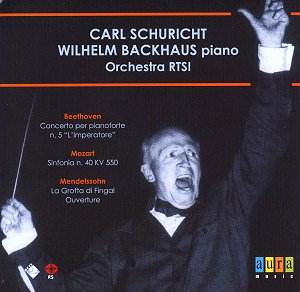Carl Schuricht was eighty-one when he gave this concert
at the Kursaal Teatro Apollo in Lugano in April 1961. The Emperor
joins the small list of other surviving Beethoven accompanied performances
– Kempff in 1955 in the First and Arrau in 1959 in the Third – both
made with the Orchestre National de France. The Swiss Italian radio
broadcast captures the concert in very acceptable sound; little recession
or over prominence really mars the enjoyment. The Emperor is
by no means note perfect but it captures Backhaus and Schuricht in notably
grand and animated form. The latter encourages eloquent flute and oboe
contributions in the first movement with Backhaus taking on a strata
of chamber intimacy often glossed by more gimlet-eyed performers. There’s
no doubting his chordal power, however, when he chooses to unleash it.
Yes there are fluffs and finger slips in the second movement but this
is unusually alert and strong playing, with no oases of relaxation;
some may think it rather hard-nosed and impassive but others will appreciate
its relative tensile strength and also its refusal decoratively to linger.
This is a performance, for all its digital imperfections and relative
inflexibility, that knows precisely where it’s going. Venomous attacks
accompany Backhaus in the finale along with more dropped notes, an almost
inevitable corollary of concert making; again this is distinctive, frequently
distinguished, often granitic music making, the two men making a remarkable
alliance (the pianist, at seventy-seven was the conductor’s junior by
only four years).
Presumably Aura has reversed the running order of the
concert, beginning as they do with the Concerto and ending it with the
Hebrides Overture. The Mozart would have ended it and this receives
a most persuasive and distinguished reading. Schuricht elicits some
fine first violin playing in the opening movement – something that Hermann
Scherchen could not always manage to do from the same orchestra. In
the Andante one can hear the layering of string tone, a degree of heightened
expressivity and a sense of evolutionary momentum without undue haste
– all very impressive. His minuet is strong and rock solid and the finale,
with some individual touches of rubato, generally convincing. In fact
this is, in almost all respects, a consistently excellent performance
and one that is informed by imagination, technique, experience and an
acute ear. The Hebrides plays us out, with Schuricht’s crescendos timed
to perfection. In fact the whole disc shows him as a conductor of vastly
elevated talent.
Jonathan Woolf
